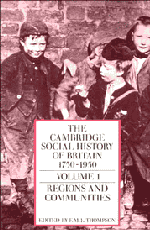4 - Wales
Published online by Cambridge University Press: 28 March 2008
Summary
‘Modern Wales’ emerged in these years with the transition from a predominantly rural society at the outset to an increasingly industrial and urbanised one and the replacement of the old social and political dominance of the landed classes by freedom and democracy. This transformation from a traditional to an urban world was, of course, a British phenomenon but, for all that, Welsh society was to exhibit characteristics which were to contrast with its English counterpart. Accordingly, a principal aim of this chapter will be to explore and explain those distinctive aspects of Wales's culture and society. Nineteenth-century Welsh society was shaped above all by its pervading nonconformist ethos and, closely bound up with it, the Welsh language. Such separate traits as emerged were to be largely neglected by successive English governments down to the 1880s, not to mention the ill-natured ridicule of things Welsh by the London press, a state of affairs which, indeed, did so much to fuel the nationalist drive of the 1880s and 1890s for securing recognition of Wales's separate identity. This distinct nationality notwithstanding, increasing industrialisation locked Wales more and more into a ‘fated mutuality’ with the English, and another aim will be to show how growing English influence had profound implications for the survival of the traditional ‘Welsh way of life’. While declining everywhere from the 1920s, this traditional ‘Welsh’ culture, based on the language, chapel and class harmony was, indeed, from the opening decades of this century to be increasingly jettisoned by the vigorous, rapidly anglicising coalfield society of South Wales, and a further concern will be to analyse the equally distinctive culture that came to replace it, a culture characterised by its remarkable degree of class and community loyalty.
- Type
- Chapter
- Information
- The Cambridge Social History of Britain, 1750–1950 , pp. 281 - 354Publisher: Cambridge University PressPrint publication year: 1990
References
- 4
- Cited by



